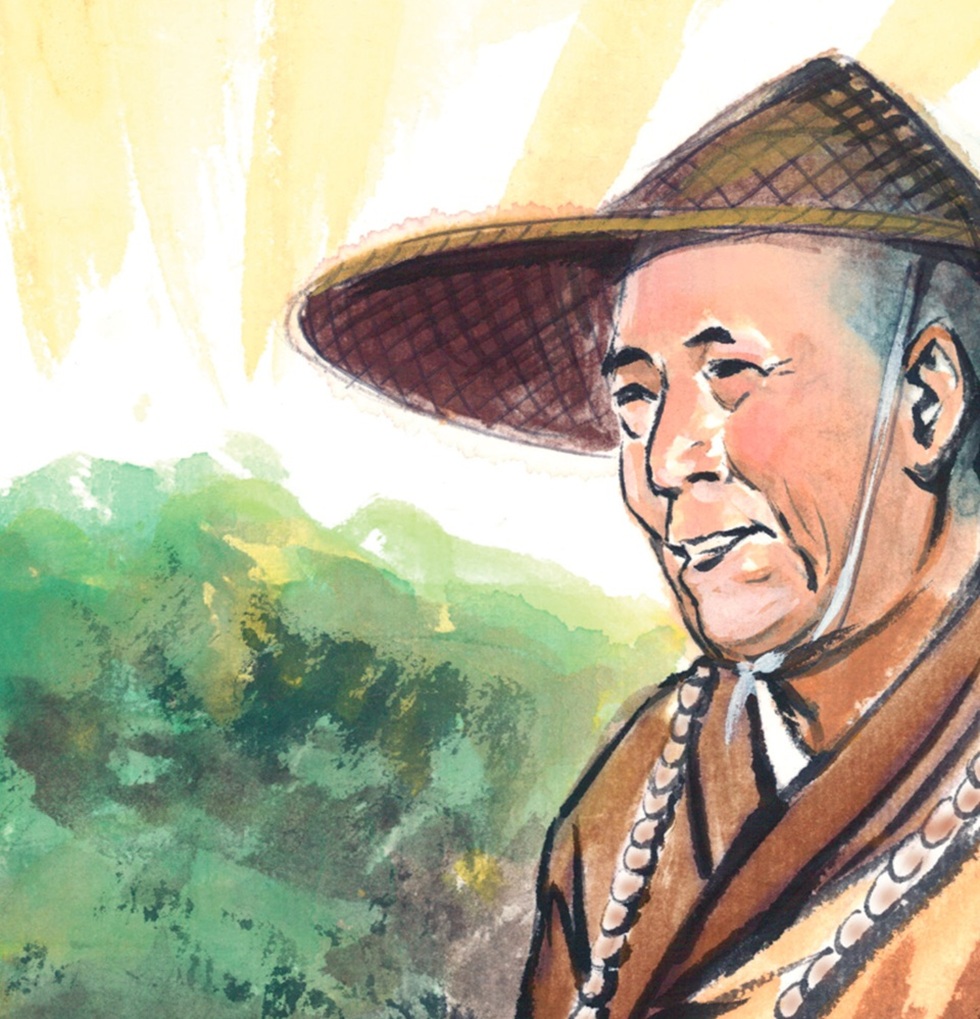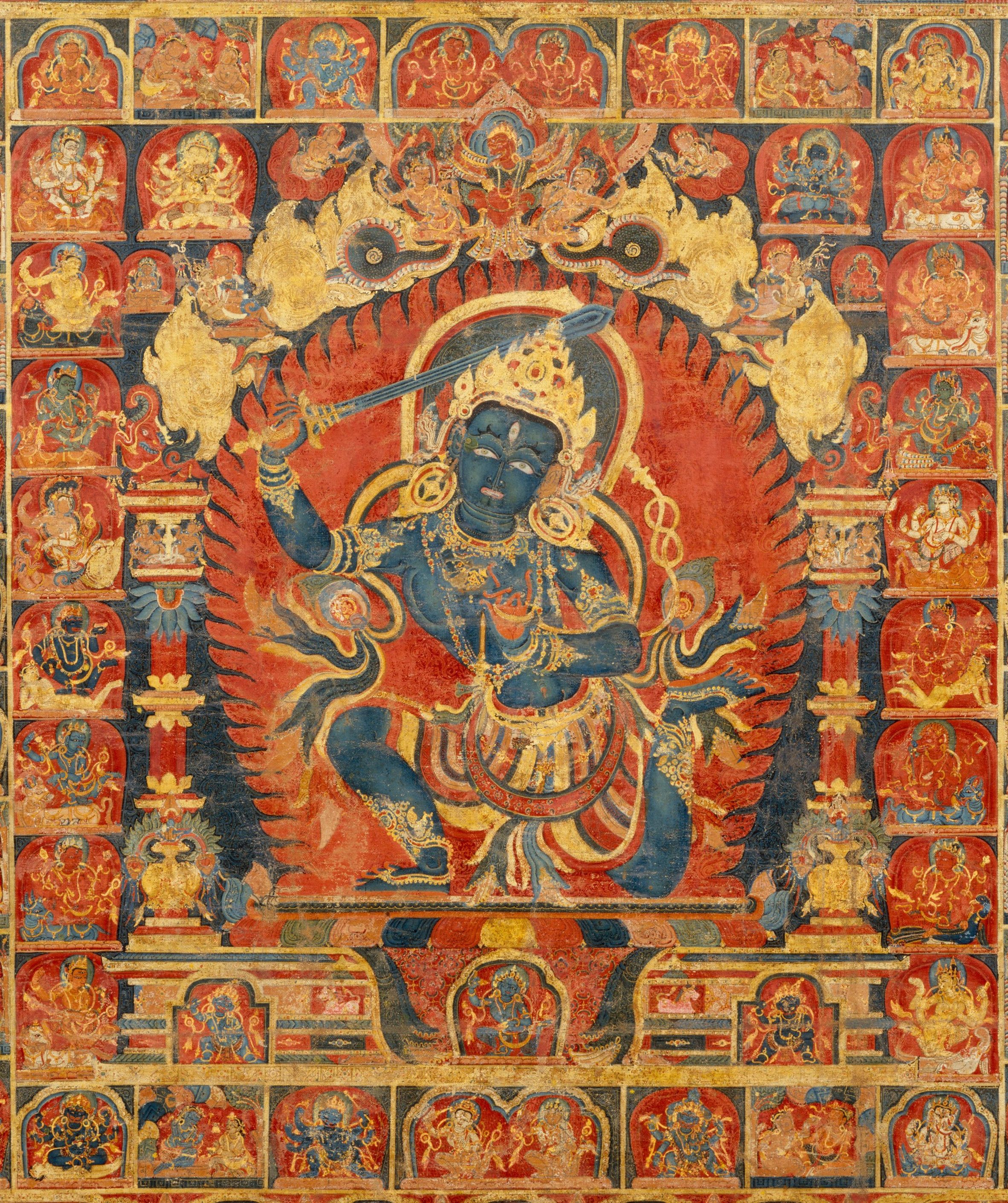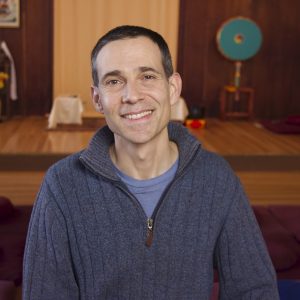
Interview with Oren Jay Sofer – Trusting the Heart and Seeing the Whole
Oren Jay Sofer has crafted a life for himself while staying true to his deeper values. In this interview, he takes us through the inner process of learning to listen to his inner voice and how through doing so, he’s been able to find fulfilling work and impact the lives of others.
Q: Tell us more about your spiritual path — however you want to interpret “spiritual path.” How did it start for you? How have you come to make sense of it? Was there something that put you onto the path?
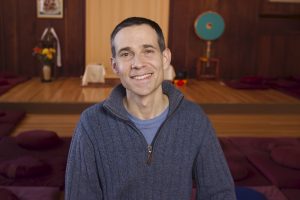
Well, who knows all of the causes and conditions that lead us to a particular path or decision, but looking back, I can see a few different experiences that helped me to find the Dharma and had a strong effect on choosing this path.
Two of those moments were in high school. I came across a little book called The Tao of Pooh by Benjamin Hoff, which, as a teenager, I totally fell in love with. It was the first exposure I had to Eastern philosophy and gave voice to a lot of ideas and sensibilities that I already had. I’d never been exposed to ideas that spoke so directly to things that I already believed or felt to be true. Then, later in high school, I got really inspired by reading the American transcendentalists Ralph Waldo Emerson and Henry David Thoreau, which also furthered my interest in Asian thought and Eastern philosophy.
In college, I was studying English literature at Columbia University in New York City, and part of the core curriculum requires taking a certain number of electives. A course in Asian Religions piqued my interest, so I signed up for it. That really deepened my desire to study more about religion and also to travel to South Asia. The course explored Hinduism, Taoism, and different schools of Buddhism. One of the professors in the class was a photographer and was in love with India. He showed us slides of his trips to India, and I was very taken with the country and the images.
A few other things happened while I was in college. My parents got divorced. I had some very painful experiences with some of the friends that I had at the time and a woman I was dating, and I ended up in a place at the end of my freshman year of just feeling really lost and experiencing a lot of suffering. So this combination of events — the interest in Buddhism and Asian thought, and these life changes that were very hard emotionally — led me to want to go to India to study abroad. I found a program that was then run by Antioch College and now is run by Carleton College, where one lived in a Buddhist monastery for three months, meditated twice a day, and gave up all alcohol, drugs, and sex. My heart leaped. I said, “Sign me up! I need this!” That was really the beginning, when I actually went to India at age 19.
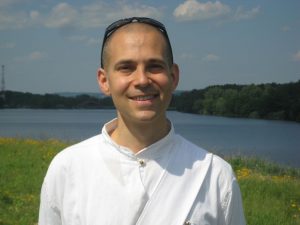
At first, I was very confused and overwhelmed when I got to India, as can be the case for many Westerners traveling to India for the first time. But the first Dharma talk I heard, I was in love. I felt like I had come home. It was kind of a similar but deeper experience to reading that little book about Taoism. It was like, “Oh, this is what I’ve been waiting for.”
Q: A lot of your work focuses on communication. I’m curious about how that became clear to you. Can you talk a little bit more about how that practice entered your life?
Some years later, I was living and working at the Insight Meditation Society in Barre, Massachusetts, the first residential Vipassana retreat center in North America that was founded by Joseph Goldstein, Jack Kornfield, Sharon Salzberg, and Jacqueline Mandell. I realized that there was something missing in my integration of the practice and that it wasn’t showing up in my conversations with my family and with co-workers. Then we had an in-service staff training on communication. I had never even heard of such a thing. I didn’t even know you could study or learn how to communicate better! I was fascinated by it.
So I started looking around, and I found a class nearby on communication that was largely based upon Marshall Rosenberg’s Nonviolent Communication. I was 23 or 24, and that was the beginning of my training and study of Nonviolent Communication. Again, it was a similar experience, where as soon as I started hearing these concepts and ideas — that all human beings have needs, we’re all trying to meet our needs, we learn to communicate in ways that are counterproductive because we are not aware of and don’t know how to express and talk about our needs with one another — it made a lot of sense, and I immediately felt a kind of homecoming in the practice of it. I started going to more workshops, classes, and trainings. Eventually, I did a leadership training and started teaching classes four or five years later. I’ve since become certified as a Nonviolent Communication trainer and wrote my first book Say What You Mean on mindfulness and NVC.
Q: You’ve mentioned a couple of times this feeling of coming home and how that guides you. I was wondering if you could talk more about what that is like for you and what it’s like to listen to that? Can you bring us more existentially into that?
I think it’s different for different people, so I can only speak about how it occurs for me. I think a lot of it has to do with what we would call “refuge in the Dharma” and saddha, faith or trust, or confidence or conviction, which is a heart-knowing. It’s an intuitive connection with something that goes deeper than rational thought.
For example, going back to when I was studying and practicing in Bodh Gaya in India, when I first heard the Dharma, I remember staying up that first night after the Dhamma Talk. I was sitting in the meditation hall. My heart was already totally convinced; there wasn’t any doubt. There was just a knowing, an understanding, a sense of settledness and clarity that this is why I’m here. This is what I’ve been waiting for my whole life — to hear this. It’s like seeing an old friend in a crowd. All of a sudden, out of the sea of faces, you recognize their face, and it’s like, “Oh, it’s you!” There’s a sense of recognition.
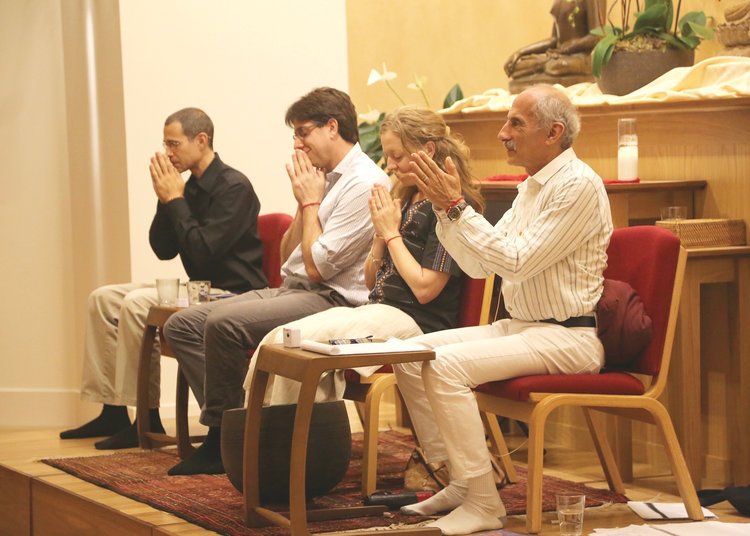 What was interesting to me was that my mind had not developed enough capacity to let go and trust what the heart already knew. The thinking mind wasn’t on board yet. So I sat and kind of half-watched and half-participated in this process of the discursive faculty, walking through the mental steps and thinking it through. “Okay, well, slow down. Hold on. Let’s think about this. What did they say? Is that true? Are there any concerns that I have?” My mind needed to go through the logical process of getting from A to B to C, even though my heart had already done that and was finished. But in order to have a sense of wholeness and completion in my heart around the choice and the decision, my mind needed to go through that process.
What was interesting to me was that my mind had not developed enough capacity to let go and trust what the heart already knew. The thinking mind wasn’t on board yet. So I sat and kind of half-watched and half-participated in this process of the discursive faculty, walking through the mental steps and thinking it through. “Okay, well, slow down. Hold on. Let’s think about this. What did they say? Is that true? Are there any concerns that I have?” My mind needed to go through the logical process of getting from A to B to C, even though my heart had already done that and was finished. But in order to have a sense of wholeness and completion in my heart around the choice and the decision, my mind needed to go through that process.
Over the years, those two have been integrated more. When there’s that kind of deep heart-knowing, the mind is able to just let go and trust it. There’s a familiarity with it and a sense of confidence that I can rely on that knowing because it’s supported and guided me so many times.
Q: That’s wonderful. I think it’s something a lot of people can relate to. And the way you just explained it was beautiful.
Thank you. Yeah, I think it’s something that’s innate in us. I remember when I was younger, my mom would say to me something along the lines of, “There’s a little voice inside each of us. When you hear that voice telling you something, you have to follow it.” I always remember that. Sometimes it’s literally a voice. Other times, it’s more of a gut feeling. And it’s been a process during my adult life of investigating and observing, when that voice or feeling is present, what are the results when I do or don’t follow it? Even from little things, like someone inviting me to a function. There’s a feeling or this voice inside that says, “Nah, don’t do that.” And then the rational mind comes in and says, “Oh, but it’ll be fun!” or “They really want you to come,” and it convinces me to go. Then I just observe and explore cause and effect: what is the result of following this impulse or not following that voice? What are the things we learn? One can look at the mind and its interaction with choices in our physical world and consider: “Well, let’s just study it. If these are the conditions and I choose this path, what’s the result?” Without fail, I see every time that I don’t trust or listen to that voice, it’s not a good result! I can look back and go, “Oh, I knew I should have followed that voice.”
Q: Something that strikes me is how you’ve really created a life and also a career based on your values and being true to your values. It’s very inspiring. And it’s a question a lot of the students at DRBU have: How does what I’ve learned here carry out into the world? How do I find work that’s meaningful? I wonder if you could share a little bit about that process.
Thank you. It’s a real blessing. I believe that one of the great gifts we can experience in life is to have work that aligns with our values, to be able to do some livelihood that we care about and is meaningful to us. One of the great tragedies of our age and our civilization is that it’s structured in such a way that so few people are actually able to do that.
Again, it’s a little mysterious how things unfold. I can point to different factors. Certainly, it wasn’t so much of a plan as much of something that happened and came together.
I certainly experienced my fair share of angst, fear, and challenge around the uncertainty of my life path — what am I doing? Where am I gonna end up? And so forth. I guess there are two things I can say concretely. One is on an individual level. I made choices along the way to keep listening to my heart and to trust it. I think that has really served me very well in the end.
When I was in my 20s, I made what were at the time difficult choices — to go on retreat, to study the Dharma, to not settle down right away, to not get married and have children — because there was something else that was more important to me.
When I was a child, I was an actor. I grew up outside of New York City, and my first love was actually theater and acting. I did that for about eight years until I found the Dharma. When I came back from India, at the age of 20, I made a choice not to pursue my professional career as an actor. That was a real turning point. I would have had a very different life had I chosen to continue doing that! I don’t think there are right or wrong choices, per se. They’re just different paths. But I chose to follow and trust that inner knowing inside that said, “This isn’t right for you anymore, not now. Just practice, study, and learn.”
I knew from early on that I wanted to share the Dharma with others because it was so transformative for me. I thought, from very early on, “What greater gift could I offer people than the gift of understanding their own mind and having more freedom and inner freedom in their life?” That was definitely an aspiration of mine. But it was not like it is today, where you can sign up for a training to become a mindfulness teacher. There wasn’t anything like that. It was just, well, keep practicing. And at some point, if your practice matures enough, your teachers may invite you to teach. That ended up being the case for me. 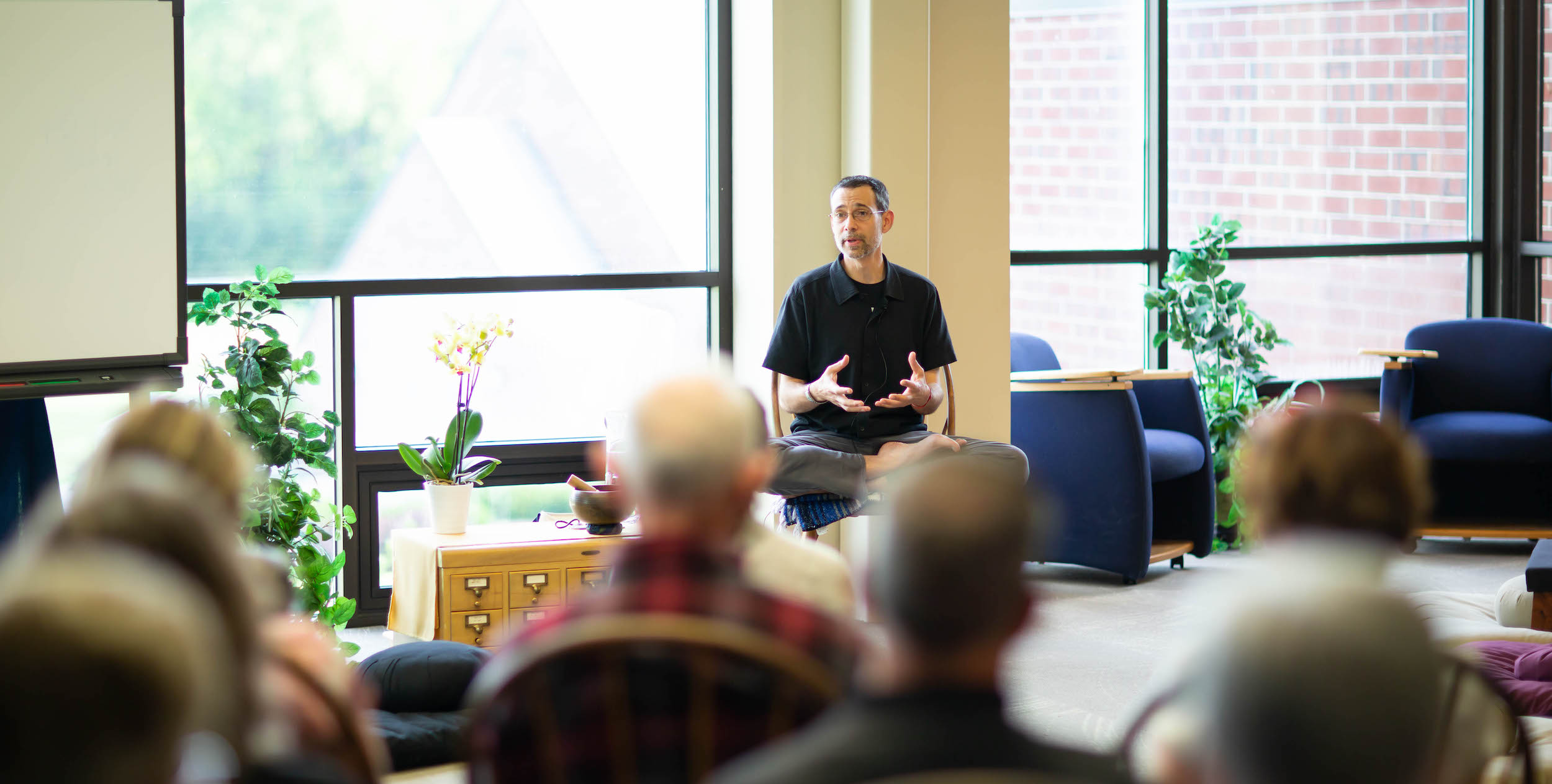
So, on a personal level, I can see how those choices I made have led to this result. I’m also aware that on a more collective level, there are many factors that have led to my being able to make a living and a livelihood out of sharing these practices that I would call privilege. For example, I went to a very good college, and my parents’ economic situation was such that they took out loans to pay for it. So I didn’t have any debt when I left college. I grew up in the late 1970s and 1980s, at a time when the economy in the United States was growing very rapidly. My father was able to put himself through college and make a living in his field. There are many factors on a broader, historical level that led to me — a young, white, heterosexual male graduating from college without debt and being able to travel to India and go on meditation retreats. Had I had tens of thousands of dollars of debt, it would have been more difficult to do those things.
I also recognize that aspects of the material success that I’ve had in life are due less to my own talent and more to the way our society is structured. One might look at my book, Say What You Mean, which has been received remarkably well and reached many people, and interpret that in different ways. One can say, “It’s a good book. It’s very valuable. It came at the right time. And therefore it reached a lot of people.” You can also look at it and say, you know, here’s an educated white male whose way of thinking and presenting things fits with the dominant paradigm and what people value and praise.
So when looking at these questions of making a livelihood and following your path, I think there can be a tendency to consider it only on an individual level, and that can be quite limiting and even damaging in some cases. Because depending on our social location and some of the factors of our personal history, that can have dramatic effects on the likelihood of our being able to earn a livelihood in a way that is easily aligned with our values. For example, if we grew up in a family where there was a lot of abuse and trauma or addiction, it can make it much harder in many ways to excel in life if we don’t have access to the financial, emotional, or spiritual resources to do healing and growth work in order to recognize that inner knowing and follow that.
There’s only so much personally that I feel like I can take credit for. And for others who are trying to find their way or who are looking at these questions, I always want to balance the personal with that more social and collective dimension of our experience because both are very important, and both play a role.
